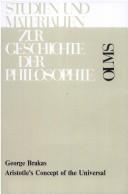
ARISTOTLE'S CONCEPT OF THE UNIVERSAL
By George Brakas
Subjects: Universals (Philosophy), Universals (philosophy), Aristotle, History
Description: Given the fundamental importance of universals to Aristotle's philosophy, it is surprising that no systematic account of his views on this subject exists. The purpose of Brakas's essay is to help fill that gap in Aristotelian studies. He argues that Aristotle's concept of the universal went through three phases. According to his early view, the universal is an existent, an existent that is distinguished from particulars by being asserted of several other existents (particulars being asserted of none). He tries to clarify this concept by explicating the two major terms of its definition, "an existent" (on) and "is asserted of." He explains "an existent" on the basis of Aristotle's doctrine of the categories and "is asserted of" (or "is said of") on the basis of his early theory of the simple statement. According to his middle view, a universal is still an existent, but it is now distinguished from particulars by being in several other existents, not by being asserted of them. According to his late view, a universal is no longer an actually existing thing at all, but a mere potency. Brakas closes the essay by tracing the movement of thought on universal through Socrates, Plato and Aristotle and concludes that Aristotle's mature view leaves us in a position closer to the original Socratic conception.
Comments
You must log in to leave comments.